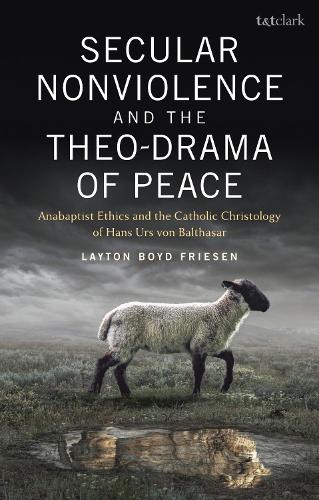
Secular Nonviolence and the Theo-Drama of Peace: Anabaptist Ethics and the Catholic Christology of Hans Urs von Balthasar
(Paperback)
Available Formats
Publishing Details
Secular Nonviolence and the Theo-Drama of Peace: Anabaptist Ethics and the Catholic Christology of Hans Urs von Balthasar
By (Author) Dr Layton Boyd Friesen
Bloomsbury Publishing PLC
T.& T.Clark Ltd
7th April 2022
United Kingdom
Classifications
Tertiary Education
Non Fiction
Theology
230.209
Physical Properties
Paperback
264
Width 138mm, Height 212mm, Spine 18mm
326g
Description
What happens when a five-century tradition of Christian pacifism no longer needs Jesus to support nonviolence Why does secularity cause this dilemma for Mennonites in their theology of peace Layton Boyd Friesen offers an ancient theology and spirituality of incarnation as the church's response to the non-resistance of Christ. He explores three key aspects of von Balthasar's Christology to help Mennonite peace theology regain its momentum in the secular age with a contemplative union with Christ. This volume argues that the way to regain a Christ-formed pacifism within secularity is to contemplate and enter the mystery unveiled in the Chalcedonian Definition of Christ, as interpreted by Hans Urs von Balthasar. In this mystery, the believer is drawn into real-time participation in Christs encounter with the secular world.
Reviews
In this important work, Anabaptist peace and Balthasarian beauty meet and kiss one another in the person of Jesus Christ. This is a book of constant surprises, from its insightful retrieval of St. Maximus Confessor to its moving descriptions of Gods urgent, non-resistant love. An illuminating exploration in cross-confessional Christian ethics. -- Joseph Mangina, Wycliffe College, Canada
Secularism may suppose that the Mennonite peace ethic no longer requires theological underpinnings. Appropriating the incarnational theology of the Catholic theologian Hans Urs von Balthasar, Layton Friesens seminal work challenges secularisms allure, and persuasively argues for a theo-dramatic, gospel pacifism that leads to the genuine healing of the human community. Highly recommended! -- Karl Koop, Canadian Mennonite University, Canada
In Secular Nonviolence and the Theo-Drama of Peace, Layton Friesen has made a substantive, and much needed, contribution to a Mennonite theological ethic. Appealing to the Anabaptist tradition of Schleitheim, Marpeck, and Martyrs Mirror, and appropriating the Orthodox Christology of Maximus the Confessor as mediated by the theo-dramatic perspective of Catholic theologian Hans Urs Von Balthasar, Friesen reclaims the Chalcedonian definition of Christs incarnation as the dogmatic undercarriage of gospel pacifism. Crucially, Friesen demonstrates how Christs bidirectional nonresistancehis personal yieldedness to the Father and to the human conditionis the spiritual centre and practical pattern of defenseless discipleship. Friesen thus helpfully shifts peace apologetics away from the secular rhetoric of the social-political relevance of nonviolence typical of modern Mennonite peace positions and programs and back towards a distinctively Christian ethic grounded dogmatically in the churchs confessional-contemplative union with the incarnate-crucified Christ and motivated evangelically by God-in-Christs love for the world. I heartily commend Friesens work to Mennonite theologians and ethicists, both scholars and students, in sincere hope that it receives the serious, patient engagement that it deserves. -- Darrin W. Snyder Belousek, author of Atonement, Justice, and Peace: The Message of the Cross and the Mission of the Church, USA
Author Bio
Layton Boyd Friesen is Conference Pastor of the Evangelical Mennonite Conference, Canada.
